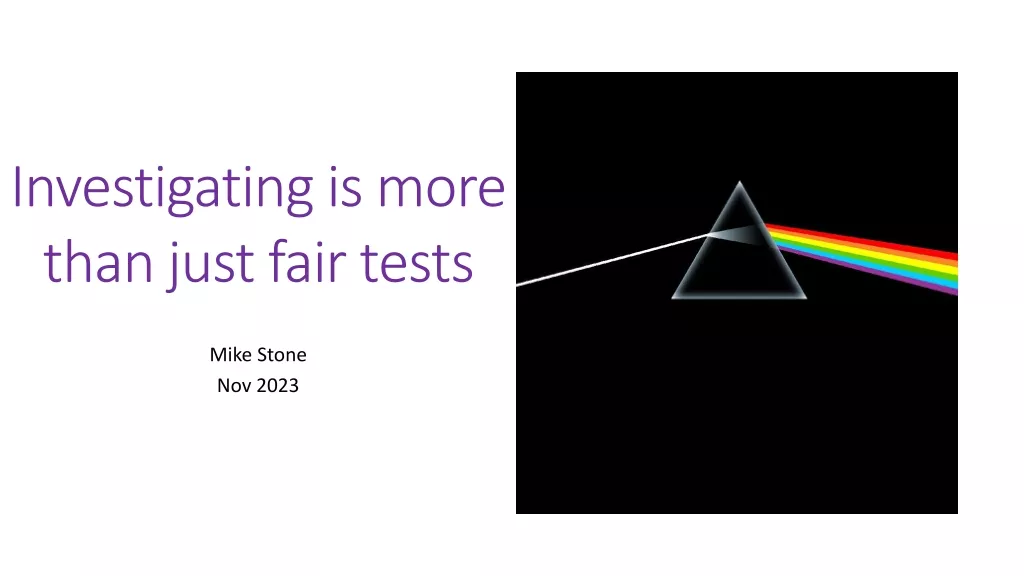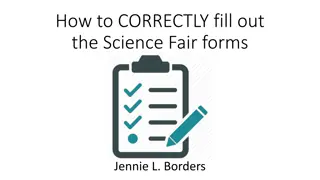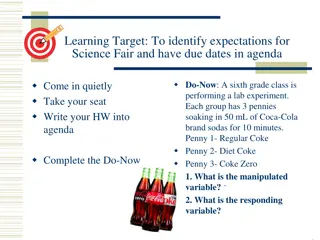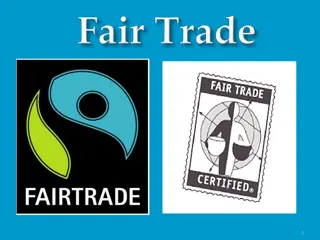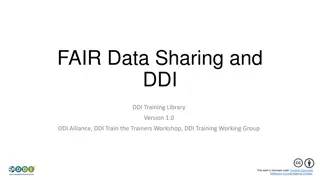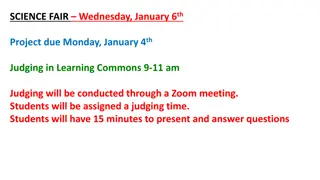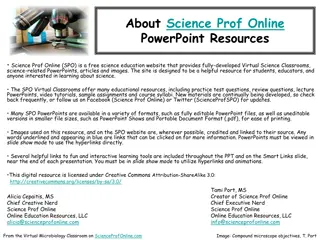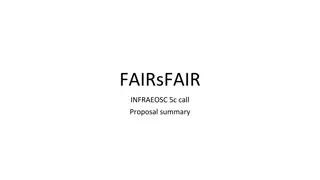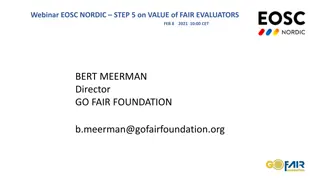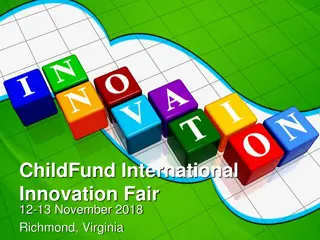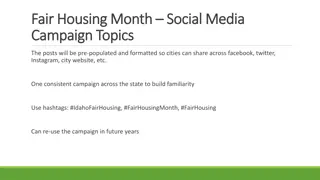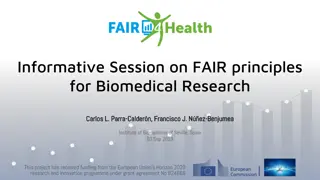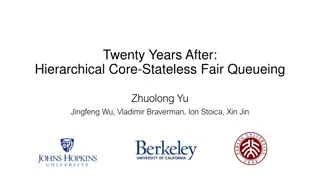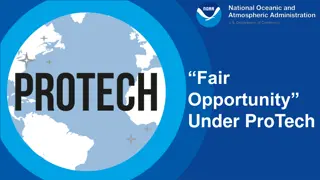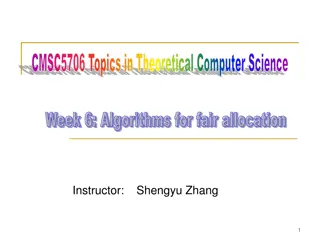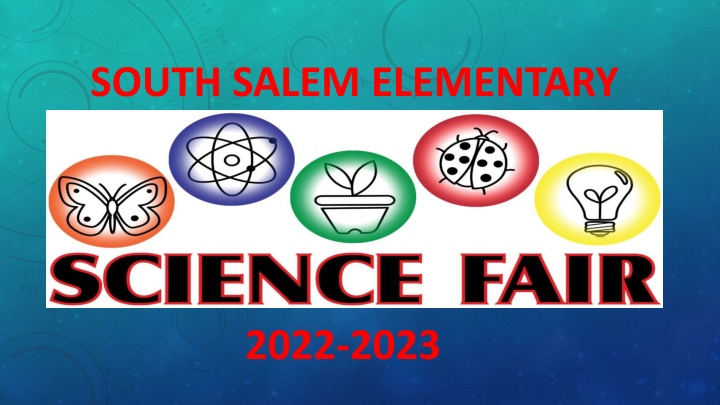
Engaging Science Competition for Students at South Salem Elementary
Engage students in authentic research and problem-solving at South Salem Elementary's science competition. Students explore real-world science, defend their research, and showcase projects in various categories. The competition emphasizes scientific reasoning, original design, and the ability to defend projects effectively.
Download Presentation

Please find below an Image/Link to download the presentation.
The content on the website is provided AS IS for your information and personal use only. It may not be sold, licensed, or shared on other websites without obtaining consent from the author. If you encounter any issues during the download, it is possible that the publisher has removed the file from their server.
You are allowed to download the files provided on this website for personal or commercial use, subject to the condition that they are used lawfully. All files are the property of their respective owners.
The content on the website is provided AS IS for your information and personal use only. It may not be sold, licensed, or shared on other websites without obtaining consent from the author.
E N D
Presentation Transcript
SOUTH SALEM ELEMENTARY 2022-2023
PURPOSE To expose our students to the real- life world of science To allow our students to engage in a long-term project that requires authentic research and problem- solving skills To give our students an opportunity to learn how to effectively defend their own research
LEVELS OF COMPETITION School K-12 ; Teacher(s) organize the school level competition . County K-5; Top project per category (Engineering, Life Science, Earth & Space Science, and Physical Science)
TOP 5 THINGS THE JUDGES LOOK FOR: Sound scientific reasoning Sufficient number of trials (at least 3 trials are needed) Complexity (based on age) Original design Ability to defend the project
WHAT TYPES OF PROJECTS CAN COMPETE? Experimental Student designs a controlled experiment that includes a hypothesis, procedure, data, and conclusion. Engineering Students design and build a prototype to help solve an existing problem.
K-5th Grades: virtual presentation Title (Unique, Hook, Attention getting) WHAT ARE THE MAIN PARTS OF THE PROJECT? Question (What do you wonder ? What made you think about this topic?) Hypothesis (What do you predict/hypothesis will happen? Variables (Controlled and the Independent What stays the same? What changes?) Materials (A list of EVERYTHING you will use/did use) Procedure (Step by step sequence .anyone should be able to repeat the project/test/experiment based upon your detailed procedure. Take PICTURES!) Data/Graph (Chart or graph of data collected, observations, measurements, changes) Analysis (What did the data tell you? What happened?) Conclusion (Was your hypothesis correct? Incorrect? Why did that happen? What did you learn? Application(How will you use this information? How would this information help others?)
STEP 1: SELECTING A TOPIC Physical Science Life Science Earth and Space Science Engineering A branch of science that deals with living organisms and life processes . The branch of science that deals with the study of inanimate natural objects, including physics, chemistry, astronomy, and related subjects. The branch of science that deals with the earth or with one or more of its parts. The branch of science and technology concerned with the design, building, and use of engines, machines, and structures.
on What is the effect of ____________ The Effect Question: ____________? How Does the ______________ How Does Affect Question: affect ___________? Is/ do/ makes/ tastes ____________. Which/What _____________ The Which/What and Verb Question:
Conduct Research. STEP 2: RESEARCH AND FORMING A HYPOTHESIS Hypothesis: What do you think will happen, (even before you start your experiment)? Your hypothesis should not only predicts what will happen in the experiment, but also show that the you used research to back up your prediction.
STEP 3: TEST YOUR HYPOTHESIS BY DOING AN EXPERIMENT First: Gather your materials: What will you need to perform your experiment? Second: Write a PROCEDURE. A procedure is a list of steps that you did to perform an experiment.? Third: Identify your variables. Fourth: TEST, TEST, TEST. Fifth: Collect your DATA. Sixth: Write a Conclusion: tell us what happened. Was your hypothesis right or wrong or neither? Seventh: Understand its Application. Write about how this experiment can be used in a real life situation. Why was it important to know about it?
WHAT ARE THE JUDGES LOOKING FOR? Unique idea, genuine Step by step details Detailed summary based on data and observations Clean, neat, photos, diagrams, labeled, colorful Complete sentences. Words spelled correctly. Punctuation! Answer questions about your project, ideas, data and conclusion. Present your project and explain your work!
This is on the green paper that came home with Science Fair Packet.
NEXT STEPS: Science Fair packet sent to all participants Pick your topic and form question Fill out paperwork for experiment (Date is important) Begin working on project Keep up with timeline and send in packet for teacher check-ins. Teachers will send you a reminder email.
TIMELINE South Salem Science Fair competition will be held November 30th, 2022. Names of the 1st place winner for each area (Engineering, Life Science, Earth & Space Science, and Physical Science) will be submitted December 2,2021. The district Science Fair will be held December 17, 2022.
QUESTIONS: If you have any questions, please email your student s teacher or Mrs. Day. day.buffy@newton.k12.ga.us

